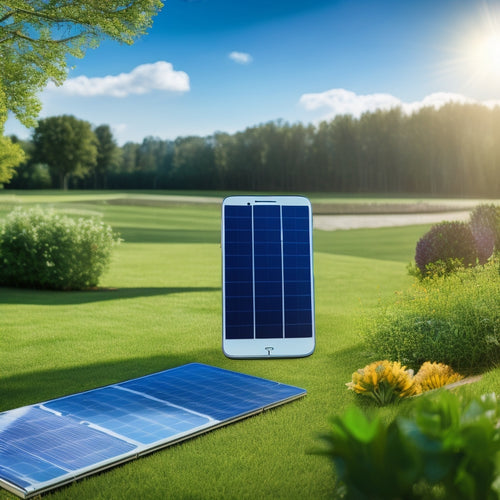
3 Best Tax Breaks for Rainwater Harvesting Systems
Share
You can claim significant tax breaks on rainwater harvesting systems, with the federal government offering a 26% tax credit, plus additional state and local incentives that can further reduce your expenses. You're eligible for this credit if your system generates electricity or heat water, and you'll need to keep detailed records and receipts to maximize your savings. Additionally, you may be able to take advantage of state-specific rebates, grants, and property tax exemptions. Moreover, depreciation deductions can lower your taxable income, and by integrating energy-efficient systems, you can enhance your savings. To reveal the full range of benefits, investigate the specifics of each incentive.
Key Takeaways
- Federal tax credits provide 26% of total cost as a credit for rainwater harvesting systems that generate electricity or heat water.
- State and local incentives, such as rebates and grants, can significantly offset installation costs for rainwater harvesting systems.
- Depreciation tax benefits allow system owners to claim deductions, lowering taxable income and resulting in long-term savings.
- The California Program offers rebates for residential and commercial properties, while Texas provides a sales tax exemption for equipment.
- Detailed record-keeping, including receipts and manufacturer certifications, is essential to maximize tax benefits and ensure compliance with IRS requirements.
Federal Tax Credits Available
The Internal Revenue Service (IRS) offers a worthwhile incentive for homeowners and businesses investing in rainwater harvesting systems: the Residential Renewable Energy Tax Credit.
You can claim a tax credit of 26% of the total cost of your rainwater harvesting system, including equipment and installation.
To qualify, you must meet the federal guidelines and eligibility criteria, which include using the system to generate electricity or heat water.
Additionally, it's crucial to understand the importance of reporting obligations and maintaining detailed records, including receipts and manufacturer certifications, to support your claim.
Make sure you follow the IRS's specific requirements to maximize your tax savings.
State and Local Incentives
Many states and local governments offer additional incentives for rainwater harvesting systems, providing you with even more opportunities to offset the costs.
You can benefit from state programs that provide rebates, grants, or low-interest loans for installing rainwater harvesting systems. For instance, California offers a rebate program for residential and commercial properties, while Texas provides a sales tax exemption for rainwater harvesting equipment.
Additionally, local ordinances may exempt rainwater harvesting systems from property taxes or offer other incentives. Research the specific state and local incentives available in your area to maximize your savings.
Depreciation Tax Benefits
You've already investigated federal and state incentives for rainwater harvesting systems, and now it's time to tap into another important benefit: depreciation tax breaks.
As a property owner, you can claim depreciation tax deductions on your rainwater harvesting system, which can greatly reduce your taxable income. By integrating sustainable and energy-efficient solutions, such as solar-powered charging solutions, you can further optimize your system's performance and increase your savings.
Additionally, considering the benefits of energy storage systems can also enhance your overall energy efficiency. To do this, you'll need to establish a depreciation schedule that outlines the system's useful life and its declining value over time.
Frequently Asked Questions
Do Rainwater Harvesting Systems Qualify as Capital Improvements?
You'll be glad to know that, yes, rainwater harvesting systems typically qualify as capital improvements, making you eligible for tax deductions on installation costs, which can greatly offset the upfront expense of going green and gaining independence.
Can I Claim Tax Breaks for DIY Rainwater Harvesting Systems?
As you commence on your DIY rainwater harvesting expedition, remember the sweat and toil of pioneers who paved the way for freedom; now, you're wondering if your installation costs are tax-deductible - yes, you can claim tax breaks, but be prepared to provide thorough tax documentation.
Do Rainwater Harvesting Systems Increase Property Value?
You're wise to contemplate how rainwater harvesting systems impact property value; as a savvy property investment, they can increase it, thanks to the environmental benefits, such as reduced stormwater runoff and lower water bills, making your home more attractive to eco-conscious buyers.
Can I Use Harvested Rainwater for Swimming Pools?
You're drowning in a sea of possibilities when it comes to using harvested rainwater for your swimming pool! Yes, you can, but only after proper rainwater filtration to guarantee water quality, reducing swimming pool maintenance and saving you a world of hassle.
Are Rainwater Harvesting Systems Eligible for Rural Development Grants?
You'll find that rainwater harvesting systems can be eligible for rural development grants, depending on the specific program and location; research grant eligibility and investigate funding sources like the USDA's Rural Utilities Service to determine if your project qualifies.
Related Posts
-

3 Earth-Loving Furniture Tips for Energy-Smart Homes
When furnishing your energy-smart home, you have the power to reduce your carbon footprint greatly by making consciou...
-

7 Best Solar Panel Upkeep Apps for Homeowners
You can optimize your solar panel's energy output and efficiency by up to 20% with regular maintenance, which is wher...
-

3 Eco-Friendly Automated Blinds for Contemporary Living
You're looking to raise your living space with automated blinds that not only exude contemporary style but also align...


